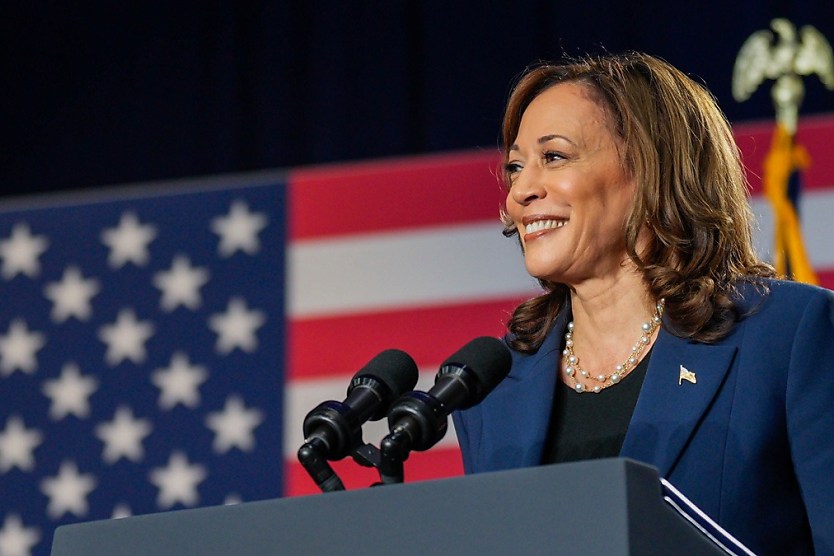Unfounded criticism of Kamala Harris as ‘DEI hire’ a reminder of need for robust workplace initiatives
SHARE THIS ARTICLE

Meaningful, substantive engagement by workplace leaders is essential in overcoming unhelpful, negative perceptions and vitriol, like that surrounding Kamala Harris.
Since US President Joe Biden announced last week that he was no longer seeking re-election, paving the way for Vice President Kamala Harris to ascend to the top of the Democratic ticket, she has resoundingly won over her party’s base and raised hundreds of millions of dollars in the process.
Last week, HR Leader reported on how the explosion in fundraising for Harris’ candidacy, in the immediate aftermath of Biden’s endorsement of her, highlighted the need for Australian businesses to continue investing in diversity.
However, the past week has also seen a resurgence of criticisms of the vice president, with the most popular line of attack being that she is a “DEI hire”.
In an interview with CNN, Republican Congressman Tim Burchett, from Tennessee, said Biden chose Harris as a running mate back in 2020 because she was a black woman.
Burchett said: “100 per cent she is a DEI hire.”
Another Republican, Congresswoman Harriet Hageman, said: “Intellectually, just really kind of the bottom of the barrel ... I think she was a DEI hire. And I think that that’s what we’re seeing, and I just don’t think that they have anybody else.”
But it is not just conservative elected officials in America making such claims.
Writing late last week in The Australian, columnist Janet Albrechtsen said: “Having been dragged out of the race, Biden has done what all good DEI Democrats do: endorse a person as the next US commander-in-chief in large part because she ticked the two top boxes on the identitarian checklist.”
In a presidential election that will undoubtedly be close and which will be won on the margins, Harris and the Democrats will likely continue to face such attacks.
This is despite the nonsensical nature of the criticism, given that Harris – a former district attorney in San Francisco, attorney-general of California, and now vice president of the United States (positions she was elected to, over many years in public service) – is eminently more qualified to assume the presidency than Donald Trump was in 2016 and his new running mate, J.D. Vance, who has served just two years in the US Senate.
According to freelance sustainability, DEI and wellbeing consultant Jessie Goldie, these lines of attack on Harris are “ignorant” and are evidence of deep-seated biases.
“Despite Harris’ extensive qualifications, this narrative seeks to undermine her success and ignores the value she brings to the table, particularly given the lack of diversity in the White House (and political leadership around the world),” said Goldie, who has previously served at Zip Co, Oxfam, and Deloitte.
Darshana Parekh, a senior legal counsel at Canon Australia and inclusion consultant, said the “DEI hire” commentary surrounding Harris is “unacceptable” and furthers a concerning trend of downplaying the qualifications of women and people of colour.
“According to Catalyst, a global non-profit, ‘emotional tax’ is the burden of feeling different due to gender, race, or ethnicity, being on guard against bias, and experiencing adverse effects on health and wellbeing. This emotional tax is a daily reality for women and people of colour,” Parekh said.
As an inclusion consultant, Parekh reflected, she has witnessed how assumptions based on stereotypes diminish empathetic leadership.
“Leaders who seek to understand and value the diversity within their teams play a crucial role in creating inclusive work environments. However, empathy can wane when leaders are more comfortable with stereotypes than with learning about individuals,” she said.
When such comments permeate mainstream media, Goldie stressed, “they inevitably influence many workplaces in our globalised world”.
This underscores, she posited, the need for robust DEI initiatives “that are leader-led, authentic, measurable, and tailored to organisational needs”.
“They are not about checking boxes, but about fostering environments where every individual is valued for their skills and contributions,” Goldie said.
“It takes meaningful work and leadership engagement to shift damaging perspectives shaped by ill-informed and biased discourses like the ones targeting Kamala Harris.”
“Honest conversations about DEI are essential to ensure that everyone, regardless of their background, receives the respect and opportunities they deserve.”
The backlash against Harris, Parekh said in support, is a “stark reminder” of why continuing with DEI initiatives is crucial.
“They aim to dismantle systemic biases that hinder the progress of individuals like Harris and create spaces where all individuals, regardless of their background, can thrive,” she said.
“By fostering empathy and understanding, we can move towards a more inclusive and equitable society where conformity does not define leadership.”
Jerome Doraisamy is the managing editor of Momentum Media’s professional services suite, encompassing Lawyers Weekly, HR Leader, Accountants Daily, and Accounting Times. He has worked as a journalist and podcast host at Momentum Media since February 2018. Jerome is also the author of The Wellness Doctrines book series, an admitted solicitor in NSW, and a board director of the Minds Count Foundation.

